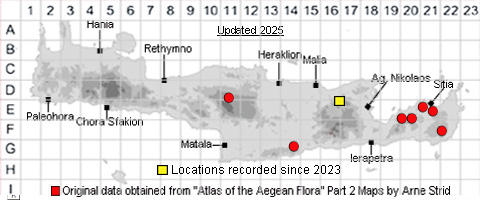
SPECIES DESCRIPTION
VERONICA TRICHADENA
Family and Genus:- See- PLANTAGINACEAE/Sect. POCILLA
Common Names:- None
Homotypic Synonyms:- Cochlidiosperma trichadena, Veronica cymbalaria
ssp. trichadena, Veronica glandulifera
Meaning:- Veronica (L) For Saint Veronica, who wiped the sweat from Christ's
face.
Trichodena (Gr) With hairy glands.
General description:- Low sprawling, hairy annual; stems branched at the base.
Leaves:-
1) 5-15 mm, petiolate, reniform in outline, 5- to 9-subequal lobes the end lobe the
largest, 3-veined.
2) Pedicels, much exceeding leaves, all but the lower-most alternate, the lowest
opposite.
Flowers:-
1) 4 petalled, solitary in the leaf-axils.
2) Pedicels, much exceeding leaves.
3) Calyx-segments, 3-4 mm,obovate, obtuse, patent in fruit.
4) Corolla, 6-10 mm diam, white.
5) Sepals, cordate at the the base.
6) Style, c. 1·5 mm.
Fruit:-
1) Capsule, c. 4 x 4 mm, subglobose, shallowly 2-lobed, ciliate.
2) Seeds, c. 2 x 2 mm, suborbicular, cupuliform.
Key features:-
1) Flowers, in terminal racemes (sometimes also in axillary racemes below the
terminal) or solitary in leaf-axils.
2) Seeds, at least 2 mm.
3) Leaves, 5- to 9-lobed.
4) Calyx-segments, obovate, obtuse.
5) Capsule, ciliate.
Habitat:- Rocky slopes, gorges, cliff ledges, field margins. (200-)500-1200 m.
Distribution:- Scattered in the Mediterranean region from the Balearic Islands to
SW Anatolia. Rare on Crete known from only a few locations in the Sitia area and
two elsewhere.
Flowering time:- Mar-June
Photos by:- Fotis Samaritakis
